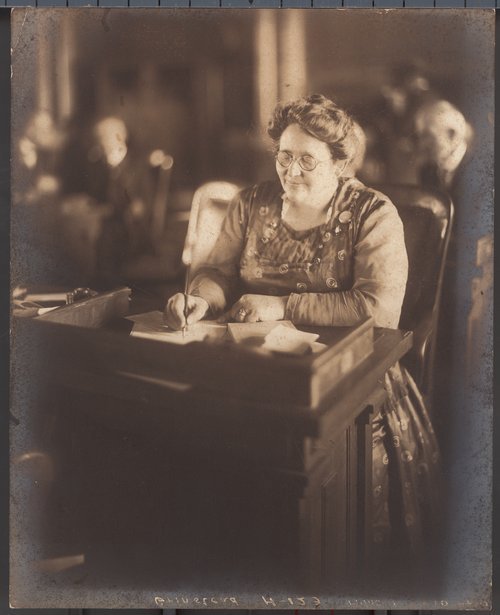By: Lauren Gray, Head of Reference
Share the gift of history this holiday season
Day 9: Calendars
[Part of the 12 Days of Archives DIY Series]
If you’re already over 2020 (and we so don’t blame you), make this adorable mini-calendar and skip forward to 2021. (Maybe we can go on summer vacation next year?) Also, you know that relative who’s impossible to buy for? Here ya go. You’re welcome.
We’ve put together a special collection of calendar images for your consideration. Our Women at Work series documents the important roles women have played in, well, every industry! (Ok, we admit, we’re pretty excited about this one.) From switchboard operators to engineers, nurses, and schoolteachers, women have made the wheels of industry turn across Kansas (and the rest of the U.S., we’re not bragging).
And honestly, we have so many powerful images in our archive of women in the workforce that we had to make hard choices about which photos to include in this entry. We’ve picked our favorite images to represent some (but not all!) of the industries in which women work. Click here to see more! https://www.kansasmemory.org/locate.php?categories=1265-1247&
For your own calendar, you’re welcome to download these images and make collages of your favorites, or you can make your own collection of Kansas photos, and use a free online calendar template and print it at home or go through a printing company. Whichever you decide, we hope 2021 is a year to remember (in a good way). We made our calendar in a Word document using the Table function, and then mounted (i.e. taped) it on a sturdy backing. We’re fancy DIYers, as you see. We even used the color printer.
Roll up your sleeves, and let’s get to work!
Farming:
Kansas is the Wheat State, and while we certainly grow a lot of it, farms aren’t just limited to those waving grains. From dawn to dusk, be it mowing, gardening, repairing or cleaning, farm work doesn’t stop.
Railroad:
The State Archive’s Railroad Collection includes film, promotional material, architectural drawings and blueprints, railway publications, payroll records, and, obviously, wonderful photographs of women at work. Pictured here is Christine Gonzales, the first female engineer with the ATSF railroad. Find more resources here: https://www.kshs.org/p/railroad-research/15983
Newspapers:
The State Archives holds the largest collection of Kansas newspapers in the world. In the 19th century, many women journalists would adopt male pen names to disguise their identity, as it was considered unladylike to participate in journalism.
Administrative:
Long considered “women’s work,” secretarial roles are integral to essential business functions, and are now, of course, held by both men and women.
Community Work:
Community groups like the Women’s Kansas Day Club and the Kansas Association of Colored Women’s Clubs worked to preserve Kansas heritage and inspire social change across the state and nationally.
Health Care:
Our health care industry is more crucial than ever during these trying times, and we give our thanks to the legions of women (and men) who are working ceaselessly for us this year.
Education:
While we no longer send our children to school with slates and chalk, the fundamentals of education have not changed: dedicated teachers make all the difference.
Arts:
From drawing, dance, music, painting and more, Kansas has inspired women to stretch the bounds of creative expression.
Domestic Work:
Whomever says chores aren’t work hasn’t lived through a long prairie winter (or coronavirus lockdown) with bored children, remote work, and a household to run.
Politics:
2020 marks the 100th anniversary of the 19th amendment, which granted women to the right to vote nationally. Women in Kansas have long been active in politics and were forerunners in the early suffrage movement. Pictured here is Minnie Grinstead, the first woman to serve in the Kansas House of Representatives.
Service Industry:
Restaurant and retail workers are part of the backbone of the American economy. Women have traditionally worked as servers, shop girls, and housekeeping staff, especially in family-run businesses.
Industry:
For the first time in American history, women adopted factory jobs en masse in the early days of World War II. However, immigrant women, young girls, and women from lower income families have worked in factories since the mid-19th century, usually in the textile industry.
On the eighth Day of Archives, my archivists gave to me: Wall Clocks
On the seventh Day of Archives, my archivists gave to me: Stationery
On the sixth Day of Archives, my archivists gave to me: Bookmarks
On the fifth Day of Archives, my archivists gave to me: Coasters
On the fourth Day of Archives, my archivists gave to me: The Memory Game
On the third Day of Archives, my archivists gave to me: Greeting Cards
On the second Day of Archives, my archivists gave to me: Magnets
On the first Day of Archives, my archivists gave to me: Puzzles
(Something to whistle while you work….)
Happy Holidays!











